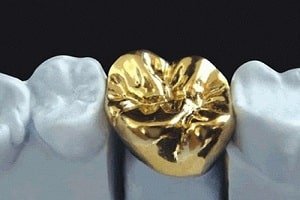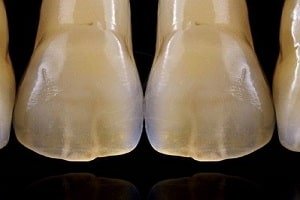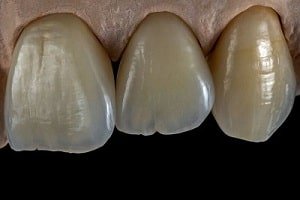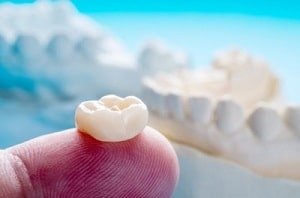We are working with No.1 Company in India for making dental crowns and bridges
At Perfect Dental® we make sure that all our dental crowns and bridges have superior fit with maximum comfort and strength


Dental Crown or Cap is a fixed dental prosthesis used to restore a damaged tooth or cover an implant. It resembles the lost, damaged or missing tooth and helps in restoring its shape, size and function.
A dental crown may be required to protect a weak tooth from breakage, to restore an already broken tooth, to cover and support a tooth with a large filling, to cover misshaped or severely discolored teeth, to cover severely attired tooth, to cover a dental implant or to make a cosmetic modification.

These crowns are the most widely used crown in India for restoring molar teeth, as they are very cost effective and long lasting. Stainless steel crowns are ideal choice for restoring molars as they can resist biting and chewing forces, and don’t break or chip off easily. Since they aren’t tooth colored crowns, they cannot be used to restore front teeth.
These are generally made from alloys that are noble or base-metal alloys. Metal crowns are ideal choice for restoring molars as they can resist biting and chewing forces, and don’t break or chip off easily. Since they aren’t tooth colored crowns, they cannot be used to restore front teeth. In our practice we consider these crowns as out-dated as they are expensive and does not possess any special advantage compared to other available options like ceramic and zirconia crowns.


PFM crowns provide best of both the worlds. They have strength of metal and aesthetics of porcelain. After all ceramic, PFM crowns are the second best in terms of providing natural tooth like color and appearance. However, porcelain part of the crown does tend to chip off if subjected to heavy masticatory forces. Sometimes the metal lying underneath such crowns can be seen as dark line especially near the gum margin. So in our practice we use these crowns for back teeth restoration or when patient cannot afford zirconia crown. We have one of the world’s best brand Tilite for porcelain fused to metal or ceramic crowns and bridges.
Emax crowns are strong as well has natural tooth like appearance due to light transmitting quality. They are the latest cosmetic porcelain. Emax crowns are highly aesthetic with excellent strength and are therefore used for front as well as back teeth restorations.


Empress Crowns provide utmost aesthetics due to its close resemblance to natural teeth. However these cannot be used to restore back teeth which are subjected to high occlusal forces due to less strength of material.
These crowns are believed to be the most beautiful porcelain crowns. However these are technique sensitive and are used only by skilled dentists and laboratory technicians.


Procera is an all-ceramic restoration that has successfully taken metal out of the mix in the production of dental crowns. They are made with an aluminium oxide as base coping that is custom milled with CAD technology and a superficial stacked translucent porcelain layer that is used to make the restoration attractive and lifelike. They are biocompatible and its tissue friendly material encourages gums to grow back around the tooth. It can be used for front as well as back teeth restorations of crown and bridges.
Zirconium crown is a CAD CAM milled all-ceramic crown that are mainly used for front and back teeth crown and bridges and as implant abutments. It has zirconia as substructure and porcelain stacked on it for optimum aesthetics. There are many brands of this product and some have higher clinical success rates. Some of these are 3M Lava, Cerec, Bruxzir, etc.

Perfect Dental® has highly talented cosmetic dentist in Jamnagar, who render beautiful smiles by fabricating life like crowns. Based on your individual requirement, our team of specialist dental professionals help you to select the right type and material of crown for you, so that you get the amazing radiant smile.
Our highly skilled best dentists in Jamnagar make sure that you don’t feel any pain while the procedure is performed. The tooth being restored is numbed so that it isn’t painful during the crown preparation. After the procedure is over and the anesthesia has worn off, the patient may feel some sensitivity with the temporary crown or some soreness in the gums around the tooth.
Dentists install crowns to perform several important functions. They protect weak teeth, restore broken teeth, prevent cracked teeth from breaking further, and support teeth that have large fillings. Crowns restore the appearance, shape, and alignment of a damaged tooth.
The average lifespan for a well maintained dental crown is typically around 15 years. However, when taken care of properly, it is common to see them last upwards of 25-30 years.
First, your dentist will apply anesthetic to numb the tooth getting the crown and the surrounding gum tissue. Then, they’ll use a dental drill and an abrasive bur to remove the outer surface of the tooth on the top and all sides, creating enough room for the crown to be placed. The dentist will then make impressions of prepared tooth and send it to laboratory for manufacturing the crown. Once the crown is ready it is cemented with special luting cement on prepared tooth.
Although the crown itself won’t be affected, there might be exposure to nerves from gum recession. Once a permanent crown is in place, it should deliver adequate bite strength and chewing capability and so the patient should be able to eat without limitations or restrictions. However, we recommend that you avoid eating sticky food, which may pull out the crown.
Decay under a crown happens because of plaque – a biofilm of food debris and bacteria that usually forms at the gum line. If plaque is allowed to form at the margin and not removed, then a new cavity will eventually form and you will need your crown to be replaced.
All-porcelain crowns are less strong and durable than their metal and porcelain-fused-to-metal counterparts. To make your porcelain crown stronger and thicker, it is needed to remove more amount of your original tooth. Moreover, all-porcelain crowns are more exposed to cracking and chipping.
Not all root canal procedures require a dental crown but every root canal does require reinforcement of the infected tooth. A crown provides full reinforcement and in majority of cases a crown is highly recommended after a root canal treatment in molar tooth.
In some cases, while a crown is one option, there can be others. You might opt for a filling instead. Also, if a substantial portion of your tooth needs filling, a better solution is usually the crown because fillings do not give you the same kind of protection as crowns do.
Perfect Dental® is the best dental clinic in Jamnagar and our team of specialist doctors is highly skilled and experienced best dentists in Jamnagar. We have a highest success rate of 97%.